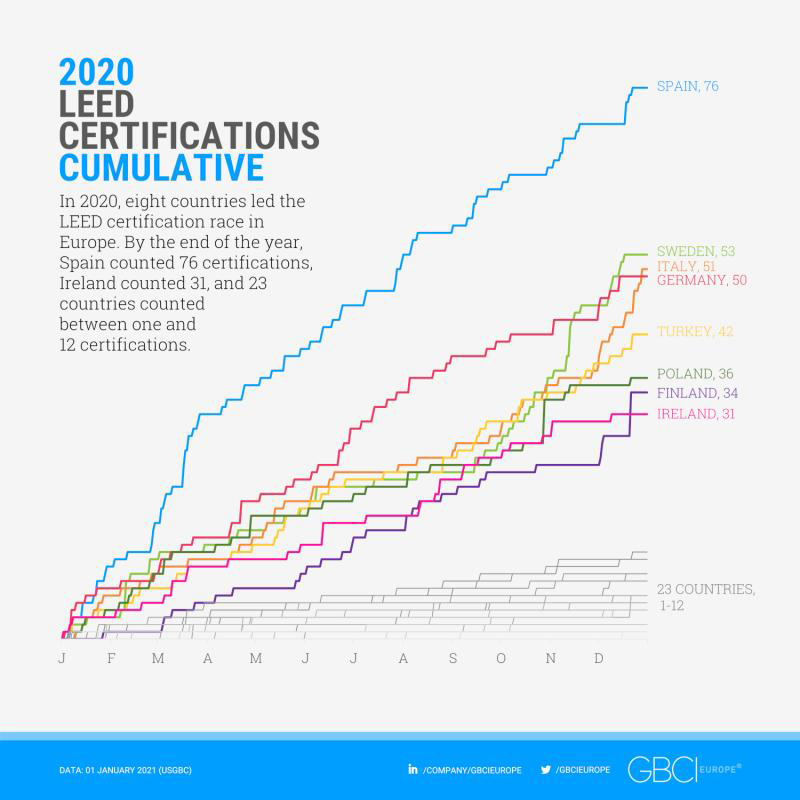Maxeon Panels Offer LEED Advantages

Green building is crucial. After all, buildings and construction are responsible for 39% of global energy-related carbon emissions.1 Building and construction activities together account for 36% of global final energy use and 39% of energy-related carbon dioxide (CO2) emissions when upstream power generation is included. Source - Global Status Report 2017 When comparing solar panels for green building projects, not all products are the same. Our flagship Maxeon direct current (DC) panels can contribute more to your project's LEED points and sustainability goals than conventional panels.
While a conventional solar panel can achieve points for the basic categories such as "Renewable Energy" (3 points) and "Heat Island Reduction" (2 points), Maxeon (DC) panels can contribute to several additional categories based on their use of more sustainable materials—for a total project contribution of 11 LEED points compared to only 5 by a conventional panel.
LEED Points Comparison
|
LEED v4 Category |
Conventional |
Maxeon (DC) Panels |
|---|---|---|
| Renewable Energy Production | 3 | 3 |
| Heat Island Reduction | 2 | 2 |
|
0-6* | 6 |
| Total Points | 5-11* | 11 |
* Estimated LEED points available is based on a search of conventional panel manufacturer websites to uncover Declare label participation, Cradle to Cradle Certification, or participation in other formalized sustainability programs. "Conventional Panel" is a solar panel made with Conventional Cells. "Conventional Cells" are silicon cells that have many thin metal lines on the front and interconnect ribbons soldered along the front and back.
Maxeon (DC) solar panels are the highest-efficiency solar panels available2 Based on datasheet review of websites of top 20 manufacturers per IHS, as of June 2020. , which means you'll need fewer panels to reach your energy goals. They are also the world's first solar panels to earn the prestigious Cradle to Cradle Certified—Bronze™ designation.3 Cradle to Cradle Certified™ is a certification mark licensed by the Cradle to Cradle Products Innovation Institute. The Cradle to Cradle Certified products program is a comprehensive product quality standard that evaluates product design, manufacturing and sourcing practices as well as corporate citizenship and ethics principles. For this certification, panels go through a rigorous evaluation of sustainable practices in the areas of: material health, material reutilization, renewable energy & carbon management, water stewardship and social fairness. Maxeon (DC) panels are also the first solar panel to receive the International Living Future Institute's Declare label.4 Maxeon (DC) panels first received the International Living Future Institute Declare Label in 2016.
These certifications can allow the flagship panel line of Maxeon Solar Technologies to contribute up to 6 more LEED points than conventional panels, which can benefit you in the following ways:
- Time: Our Maxeon panels deliver incremental points through well-established and easily accessible sustainability certifications.
- Money: Every project is different. But consider the value of 6 incremental points on a green building project5 A typical project assumes core and shell or major renovation with at least 10% of the energy offset by solar; sufficient products to qualify for Material and Resource categories; and 33% of the hardscape covered with solar or other heat island-reducing coverings. that requires 40 overall points to achieve basic LEED Certification.
- Confidence: Our Maxeon panels are proven, having contributed to many LEED certified facilities around the world.
For your next green-building project, also consider whether your supplier is itself a green builder. Maxeon Solar Technologies takes a green approach to solar manufacturing that extends beyond a product's materials and supply chain to include its manufacturing sites, too.
In August 2020, Maxeon Solar Technologies received a LEED Gold certification for our Fab 4 facility in the Philippines – our fifth LEED-certified facility, and third LEED manufacturing site. This certification means that every solar cell we produce will now come from a LEED-certified cell fabrication site.
We also have the solar industry's first and only panel manufacturing site that is certified for zero-waste to landfill in Mexicali, Mexico. It's all evidence of our corporate values to hold ourselves to a higher standard.

GBCI Europe. Counts include certifications and recertifications for all LEED systems.
Global LEED projects continue to grow, even in a global economy facing major headwinds. In fact, the number of European LEED-certified projects was up almost 5% in 2020 over prior year, even amidst the pandemic. As we renew our purpose of Powering Positive Change™, we hope these trends only accelerate.